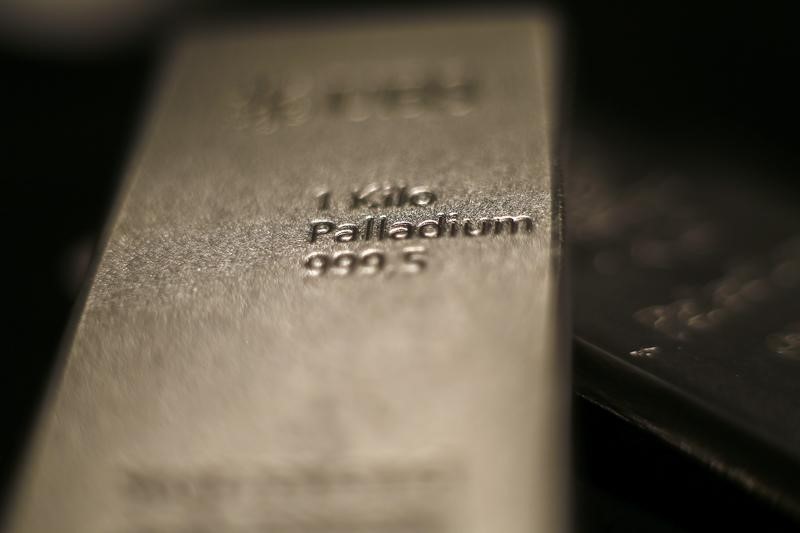By Jan Harvey and Sethuraman N R
LONDON/BENGALURU (Reuters) - Flows of palladium out of UK stocks to Hong Kong are picking up as demand from Asian industry grows, pointing to a tightening market that could keep record-high prices on the boil.
Shipments from Britain to Hong Kong rose more than 10 percent from 2016 levels in the first 11 months of 2017, UK customs data shows.
Physically-backed investment funds in London, which hold large stocks of palladium, saw large outflows at the same time, potentially feeding users of the metal, such as carmakers, in Asia.
ETF Securities, which operates the biggest palladium funds listed in New York and London, saw outflows of nearly 7,000 kg last year from holdings vaulted in Britain.
"There is a premium over London or Zurich which makes it profitable to ship metal to China or Hong Kong," Philip Klapwijk, managing director of Hong Kong-based metals consultancy Precious Metals Insights, said.
"The largest single physical market for palladium is China, and it has to import almost all it requires. Its needs have been growing very rapidly as car output has increased and emissions control legislation has got tighter," he said. "On top of that you've had some degree of speculation and stock building."
(For a graphic on 'UK palladium exports to Hong Kong' click http://reut.rs/2De6CTU)
Higher demand from the automotive sector - which uses palladium in catalytic converters, particularly in the gasoline-fuelled cars favoured in China - helped drive palladium prices <XPD=> up more than 50 percent last year, to a record $1,138 an ounce in January.
Premiums in Hong Kong jumped from the third quarter, traders in the region said, hitting $12-$15 an ounce before easing back to $5-$6 currently. Lease rates for the metal, currently low single to double digit, reached as high as 25 percent.
Dealers in Hong Kong said that, with investment demand for palladium weak in the territory, metal was being bought for industrial use.
"As the markets realised that people were buying (to meet) demand for gasoline cars, more metal was shipped to Hong Kong," one trader based there said. "As prices rose people took deliveries and shipped it. The lease rates and interest rates in Hong Kong for palladium went up."
"The fact is that there is a shortage of the metal and people hoarded and keep hoarding palladium."
Metal moving east to Hong Kong is unlikely to be seen in the market for a long time, the trading source said. "The benefit of Hong Kong is that there is a lot of storage space here and it is out of the market," he said. "Once it comes here it can be stored at a low cost for a very long period of time, and that's what people are doing."
Fund outflows have helped plug a physical deficit seen in palladium over the last decade, helping cut 2016's near 1.5 million ounce physical deficit in half.
(For a graphic on 'Palladium ETF holdings fall' click http://reut.rs/2De8OL6)
However, those stocks are running low. Global palladium ETF holdings tracked by Reuters have more than halved since the end of 2014, and now account for just over six weeks' worth of demand. Further depletion could have big price implications.
"If that source of metal starts to dry up, whether because ETF stocks are getting low or because investors are holding onto the metal tighter, you need to find other routes for it to come into the market, and that typically occurs through higher prices," ICBC Standard Bank analyst Tom Kendall said.
"That incentivises scrap flow, maybe causes demand destruction, and over the longer term incentivises producers to get more out of the ground. The issue then is the time lag between prices rising and supply responding - you can have extended periods of quite high prices."
Higher prices destroy demand by pricing some buyers out of the market.
As palladium-backed ETFs were liquidated last year, net long positioning in Nymex palladium futures rose to a record as investors used the contracts to bet on higher prices. At the same time, Nymex palladium stocks slid to their lowest since 2003.
(For a graphic on 'Nymex palladium stocks decline' click http://reut.rs/2DHVvn7)
While this is unlikely to cause a crisis, as few Nymex palladium holders take delivery of physical metal, it does flag up broader tightness.
"Stocks falling and prices going up say to me you have a physical shortage," Macquarie analyst Matthew Turner said. "ETF holdings coming down was the most bullish thing I saw all last year."
ETF holdings and futures long positioning have gone in opposite directions because futures investors tend to have a shorter outlook than ETF buyers, who may have been holding the metal for longer and therefore have been better positioned to take profits, analysts said.
The backwardation in the palladium market also creates a positive 'roll yield' from investors selling a short-dated contract and buying a longer-dated one.
